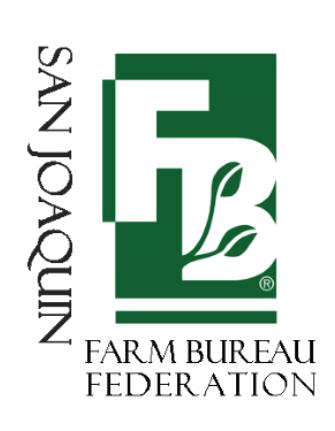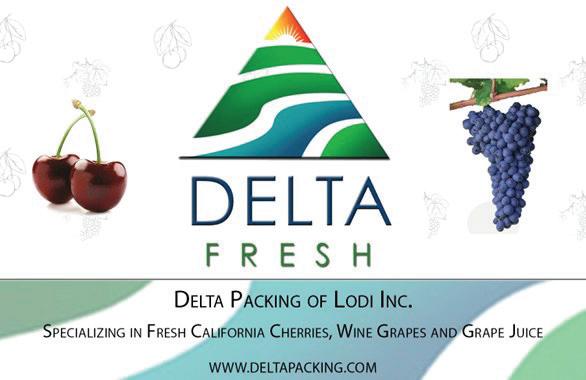
san joaquin


san joaquin
By Vicky Boyd
A RELATIVELY NEW San Joaquin County Agricultural Commissioner Office employee, Waylon, has a nose for agricultural contraband and has been described as “one of the bestest ag inspector hires ever.”
The 2-year-old black Lab mix, who is partnered with handler Erik Baxter, inspects packages at many of the county’s express carrier facilities including UPS, FedEx and DHL. The team also works in Stanislaus County as part of efforts to intercept pests that may hitchhike on illegal agricultural shipments, said San Joaquin County Ag Commissioner Kamal Bagri.
The detector dog team complements county agricultural biologists who profile and inspect agricultural packages at the facilities.
San Joaquin Farm Bureau First

By Craig W. Anderson
AS 2024 GRINDS to a finish, members of the San Joaquin Farm Bureau reflect on the nearly completed year of agriculture, looking into the past and toward the future of the various agriculture sectors.
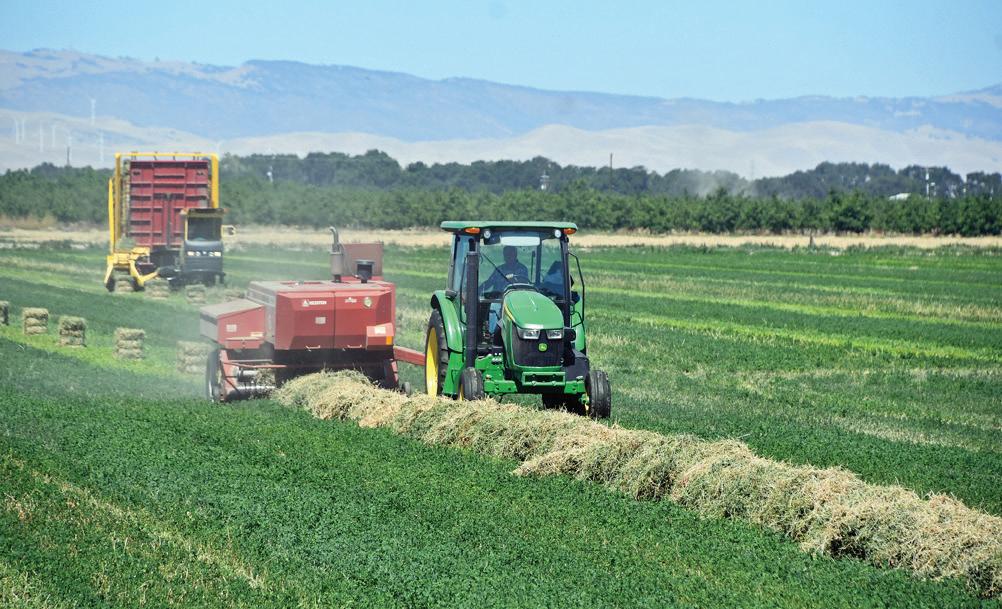
Vice President James Chinchiolo, who farms cherries and walnuts with his father near Lodi and Linden, applauded these proactive
See Detector dogs, page 3
Some issues that ag faces include high hourly wages (but a bipartisan group in the U.S. House is urging relief for farmers via a temporary freeze on rising wages) and the idea that California wants to harness more than half its land to combat climate change by 2045 along with the revival of the $18 billion tunnel to send Delta water to Southern California.
San Joaquin County farmers and ranchers have been busy this time of year bringing in crops during harvest, valued at more than $3.22 billion created by 2,948 farms with more than 34,000 workers.
One of the important elements of 2024, according to SFJB Executive Director Andrew Genasci was that it completed a “back-to-back of two good water years,” and that the
See Harvest, page 5
Acampo
Joe Salazar, Chair
Joe Petersen
Charlie Starr
Calla Nile Garden
Tim Weststeyn, Chair
Bruce Oosterkamp
David Phippen
Bryan Van Groningen
Collegeville
Chester Murphy, Chair
Kent Norman
Neil Norman Escalon
Caleb Gervase, Chair
Katie Veenstra
Paul Voortman
Lafayette
Richard Rodriguez, Chair
Stanton Lange
Daniel Meza
Alfred Nicolini
Linden
Nick Ferrari, Chair
Donald Drake
Jim Ferrari
Joe Ferrari
Steven Galvin
Roberts Union
Nick Mussi, Chair
Patrick Drury
David Strecker
Tracy
Joe Bacchetti, Chair
Phil Martin
Pete Reece, Jr.
Victor
Nick Bokides, Chair
Dave Simpson
Kelton Fleming
Officers
Les Strojan, President
James Chinchiolo, First Vice President
Herman Doornendbal Jr., Second Vice President
Directors at Large
Josh Barton
Phil Brumley
Jean Cabral, Emeritas
Jim Connolly
Karen Cultrera
Dennis Drake
Brad Goehring
Jack Hamm
Bob Hesseltine
Jim Larkin
Joe Luis
Steve Moore
Jerry Robinson
Jake Samuel
Paul Sanguinetti
Ken Vogel
Darrell Voortman
Andrew Watkins
Kenny Watkins
Advisory
Jenna Swenson, Farm Service Agency
Sonya Miller, NRCS/USDA
Krista McCoon, SJ CWA
Kamal Bagri, Ag Commissioner
Sheriff Pat Withrow, Sheriff’s Dept
Brent Holtz, UC Cooperative Extension
Staff
Andrew Genasci, Executive Director
Jessica Coit, Program Director

By Les Strojan, SJFB President
WITH MOST OF OUR CROPS IN and the election over, it’s time to pause, take stock of our operations and with new information we now have update plans for next year(s). Business as usual will work for very few going forward both on the farm and at the Farm Bureau. To support our members, we are planning three financially related events for November and December. One is on taxation and multi-generational planning. Things may be changing since your last plan was estab-

lished. There may even be actions you may want to take prior to the end of the year.
The second is a panel of local agricultural lenders to review their current lending and/or loan servicing standards and information they will need to support actions for you. Hopefully this interface can provide insights to what can be expected when meeting with lenders.
The third will be a day when we will have the local governmental agencies working with farmers to present their cur-
By Andrew Genasci
rent programs. These events will be at the Farm Bureau office in Stockton and open to all members. We will get more information to you when the details are known.
Like at many farms, next year at the Farm Bureau will be different. Operating efficiencies need to be tested to eliminate low rewarding efforts while we continue to support our members in these difficult times. We will focus on our recently up-
WELL, CHANCES ARE that you are reading this right around the election. If you are like me, you are tired of the constant ads, signs and talking heads on the tv, radio or online telling you who or what you should vote for or against! It can be frustrating and annoying, but if you are reading this before the election and you have not yet, please vote (in person if possible). I know that everyone is talking about the presidential election, and given our state’s makeup, you may feel like it is a waste of time to vote, but nothing could be further from the truth. There are a number of vitally critical issues on this year’s ballot, both on the state and local level.
Prop. 32, which would increase the state’s minimum wage to $18 an hour
beginning Jan. 1, 2025, is one we need to be out in force voting no on. In an industry already facing a lowered threshold for overtime and historically low commodity prices in many areas, this will push many of our local businesses and farms over the edge. Not because farm employees are making minimum wages, most make well above even the $18 an hour in the bill, but because when you raise the floor
President, Les Strojan First Vice President, James Chinchiolo
Vice President, Herman Doornenbal Jr.
Continued from page 1
exclusion efforts designed to avert costly pest eradication programs.
“The saying ‘nip it in the bud’ is exactly the right saying for a situation like this,” said Chinchiolo. “Before it has grown too large, it can be nipped in the bud.”
He pointed to the spotted wing drosophila fly, initially confirmed in California in 2008, as an example of a costly invasive pest. A native of Asia, the fly has since spread throughout the state and become the bane of small fruit and tree fruit growers, who spend millions of dollars annually to manage it.
During the cherry season, Chinchiolo may have to apply two to three additional insecticide sprays to manage spotted wing drosophila, depending on the season and how long he plans to let the fruit hang on the trees. Since its arrival, many packinghouses have established zero tolerance for spotted wing drosophila larvae infesting cherries.
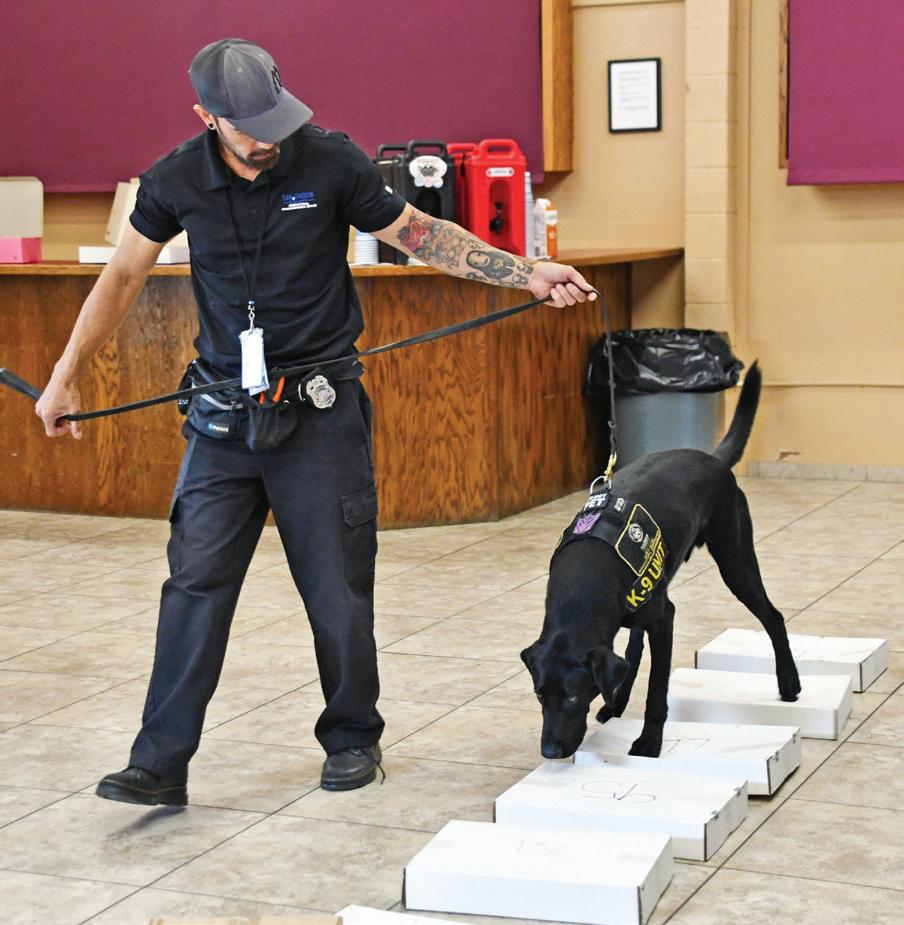
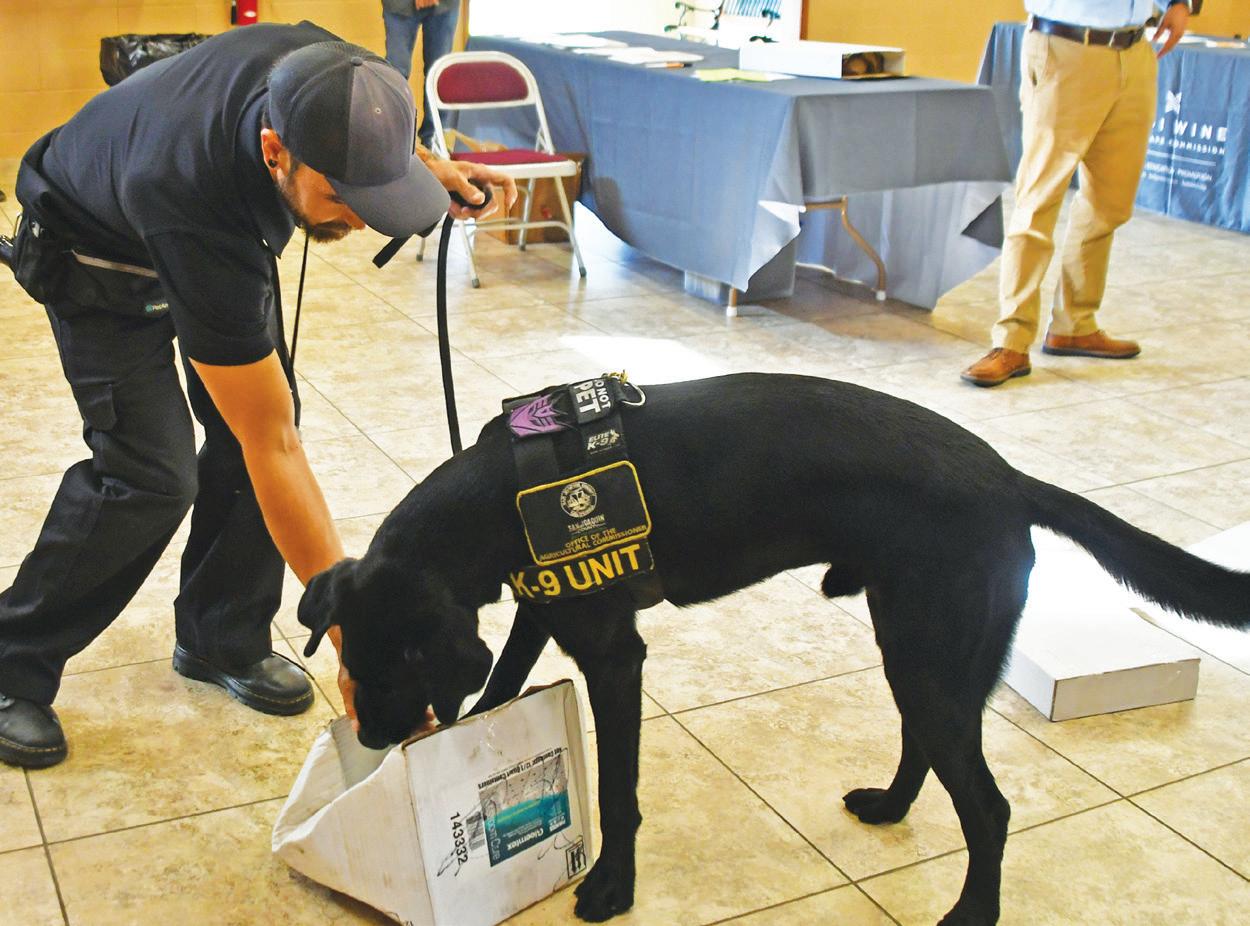
During a recent demonstration at the Lodi Winegrape Commission’s IPM breakfast, handler Erik Baxter walked Waylon over boxes to mimic conditions at a parcel facility. Unbeknownst to the two, San Joaquin County Deputy Ag Commissioner Omar Luna had hidden fruit
sniffed each box, he pawed vigorously when he reached the parcel that contained the ag product.
“I think I would be much closer to being an organic cherry grower if I didn’t have the concerns with spotted wing drophila,” he said.
USDA grant recipient
Knowing the value of detector dog teams, Bagri successfully sought U.S.
Department of Agriculture funding to help underwrite a local pair. The county had a team in the early 2010s, and Bagri had seen their increased pest interceptions. “Dogs can do much better jobs than humans,” she said.
In 2023, San Joaquin County was
When we opened our doors in 1867, our goal was to provide the highest level of service and innovation for our customers.
Now, 157 years later, we remain ever committed to providing the tools, convenience and banking services needed to help your business and your family thrive.
Thank you for being a part of our Bank of Stockton family. Happy holiday season!
As
among the counties that benefited from a $4 million USDA grant awarded to the California Department of Food and Agriculture for additional detector dogs. The financial support was in addition to more
Continued on next page

$15 million in USDA Plant Protection Act funding for other California pest detection and exclusion activities.
After the grant announcement, Bagri met with employees to gauge individual interest in becoming a dog handler, a timeconsuming commitment. Baxter, who was a biologist at the time, volunteered.
Earlier this year, he spent more than six weeks in Georgia at the National Detector Dog Training Center, which instructs both USDA and U.S. Customs and Border Patrol teams.
When asked how he became paired with his partner, Baxter said Waylon actually chose him. The black Lab mix had been returned to a shelter twice before being donated to the detector dog training center because his high energy was incompatible with families.
But Bagri said that trait, when managed with exercise and strict routines, makes Waylon an excellent detector dog. Sniffing out smuggled produce Waylon was initially trained to recognize
five scents, including stone fruit, mangoes, guavas, apples and citrus. Baxter also included soil, since many intercepted plants have soil attached. After Waylon mastered the basics, his handler slowly adds new scents. Bagri said Waylon also is learning how to recognize mixed odors, since packages frequently contain more than one crop.
The detector dog team works mostly parcel facilities, considered high risk because packages may contain illegal shipments of fruits, vegetables, meats or soil that could harbor invasive pests.
Without detector dogs, ag inspectors at the facilities typically use a package profile and watch as parcels ride past them on a conveyor, Bagri said. If they see one that fits the description, they pull it to inspect for possible agricultural contraband.
“It’s not like they have x-ray vision to look through the boxes,” she said.
But dogs have a superpower – their keen noses, which are up to 100,000 times more sensitive than humans’.
During inspections at many facilities, the handler guides the dog to walk over the tops of packages, allowing the canine

to sniff each one as it moves down the conveyor. When Waylon picks up a scent on which he’s been trained, he signals by vigorously pawing at the package, and Baxter removes it for inspection.
“Now, (Waylon’s) making our job much easier,” Bagri said about intercepting packages. “Especially at UPS, we don’t get to see the packages on the line. They’re already on the trucks. Before, we could only see so many parcels. Now with Waylon, it’s more efficient and more accurate.”
Since Waylon and Baxter began inspections in May, Bagri said they’ve already proven their worth by intercepting an uncertified shipment of sugar apples infested with live lesser snow scales and gray pineapple mealybugs. Neither pest is found in the California and could devastate the state’s ag industry should they sneak in, she said.
And Bagri is confident the detector team will only get better as they gain experience.
“You have to consider (Waylon’s) only 2 years old and he’s going to possibly work another eight years in the industry,” Bagri said. “He’s still so new – he’s still a puppy.”
More detector teams needed
The USDA owns Waylon, and he spends his off hours at a kennel in Lodi. Bagri said the USDA has strict rules about handlers not taking their teammates home for fear the dogs will become confused by different scents.
Currently the state has 14 detector dog teams, including San Joaquin County’s, but Bagri said she would like that increased to 30. As chair of the California Agricultural Commissioners and Sealers Association’s Pest Prevention Committee, she has traveled to Washington, D.C., to advocate for additional detector dogs being included in the Farm Bill.
Instead of having the funding for the dogs lumped in with overall pest prevention, Bagri said she’d prefer separate money just for the canines that can’t be spent on other activities.
“We’ve been asking the USDA and OMB (Office of Management and Budget) back in D.C. to provide funding for us,” she said. “Last year we negotiated into the Farm Bill for a separate appropriation just for detector dog teams.”

Continued from page 1
ag sectors of dairy, the No. 1 commodity in the agricultural commissioner's 2023 Crop Report, along with almonds (No. 3) and walnuts (No. 6), “turned a little bit of a positive corner...but there was no miracle turn-around.” In fact, milk and almonds, which had declined in 2023, appeared at near 2024 years end to be on their way to a modest recovery.
Apparently, the federal government is at last realizing that agriculture has been traveling a rocky road for two or three years. Agriculture Secretary Tom Vilsack remarked that while small-scale agriculture in America has experienced an increase in the average size of farms, the nation has lost 544,000 farms since 1981.
Genasci said there were no big surprises, that the ag community “kind of knew what we were in for” which was an industry suffering from inflation pressures and input costs that continue to increase. "
The No. 1 of the ag commissioner’s Top Ten Commodities in 2023 was Milk and SJFB President Les Strojan pointed out that “Milk prices seemed to strengthen but grapes [No. 2] were sad,” almonds [No. 3] were borderline and that [No. 6] walnuts, “didn’t suffer dramatically.”
SJFB First Vice President James Chinchiolo noted, “There were some high points and definitely low points this past somber year. From the weather standpoint there were challenges caused by the summer heat.”
He said his understanding of how various commodities were faring in the county seemed to indicate at this time that “beef cattle were doing well, the walnut forecast for the 2024 crop was up but that grains, hay and row crops weren’t necessarily doing great.”
Of the walnut varieties, he explained that “Chandlers, although having a down volume from an estimate standpoint seem to be all right; the early varieties were down in volume but prices will be up.”
Chinchiolo also commented on the cherry crop which he farms, noting, “It
was a good quality year but I’m disappointed that the industry doesn’t have a better promotion plan. Our cherries are undervalued in the marketplace by how they’re displayed in retail outlets. There’s little or no merchandising to consumers that meets their anticipation for the fruit.”
Dairy farmer Jack Hamm said, “Inflation is the main problem faced by dairies and all of ag, for that matter. We are an agricultural county and I think in 2024, dairy farmers will be in the black, depending on milk and beef prices.”
Milk’s commodity value decreased in 2023 to a value of $626.5 million, still a robust sum despite being $5.1 million less than the previous year.
The dairy sector in San Joaquin County and throughout California is facing the threat of the bird flu infesting dairy cows, which affects milk prices. Hamm pointed out that bird flu takes away gallons of milk production per cow and while the disease hasn’t hit San Joaquin County dairy farmers as yet, “It’s definitely a cloud on the horizon.” The bird flu “puts
cows off their feed and they feel crappy, just like we humans do when we get the flu. And like us, we have to watch out for dehydration and hydrate the cows when necessary.” Hamm found it ironic that the beef industry isn’t talking about the bird flu. He said the dairy industry and ag has “hit a rough patch that’s bearable.”
In fact, he said 2024 “started out horribly; milk prices were down in the first part of the year. Expenses remained high. But now, both are more even and dairy has become one of the brighter ag sectors, brighter than 2023 for sure.”
Hamm said it is difficult to raise replacement dairy cows and that “it’s a better deal to buy them. Cow value is better now and calf prices are good. Dairy is now hitting on all cylinders.”
Grapes face continued challenges
Clements area winegrape grower Brad Goehring said 2024 was a “normal year with bud break on time and temperature spikes that came at the wrong time. Overall, it’s been good with production on the
Continued on next page




side.”
However, he said the wine market has been a “bloodbath, with large wineries importing foreign juice to add a higher percentage to their wine instead of using our local sourced juice as they have in the past for years.”
He said regulations, new rules and the higher minimum wage “ratcheted up our input costs which have more than doubled over the last two years. However, the biggest issue is the use by big wineries of the imported juice.”
If these input costs, additional rules and regulations and the continued use of significant amounts of imported juice in lieu of local product, “we’ll have to consider the California wine industry’s ability to continue,” Goehring said.
Grape growers across California who can’t find wineries to buy their fruit are offering unprecedented discounts as they’re running out of time to make a profit from
2024’s crop. Add to this the global glut of wine and new generations of potential wine consumers not consuming because of an aversion to alcohol and it’s a serious situation.
The local wine growing season was “much more normal and the heat made the ripening relentless,” said Amy Blagg, executive director of the Lodi District Grape Growers Association. “It’s a light crop, one that continued to get lighter. All varieties across the board were affected.”
“The winegrape market is quite a challenge with most of the whites picked up but some of the reds will go unharvested,” Blagg explained. “We’re continuing to see removals but there weren’t as many quality issues.”
Stuart Spencer, executive director of the Lodi Winegrape Commission, said the market conditions were “really difficult, grapes went unharvested from last year and the big wineries using millions of gallons of cheap foreign wines as additives have helped create an unhealthy market.”
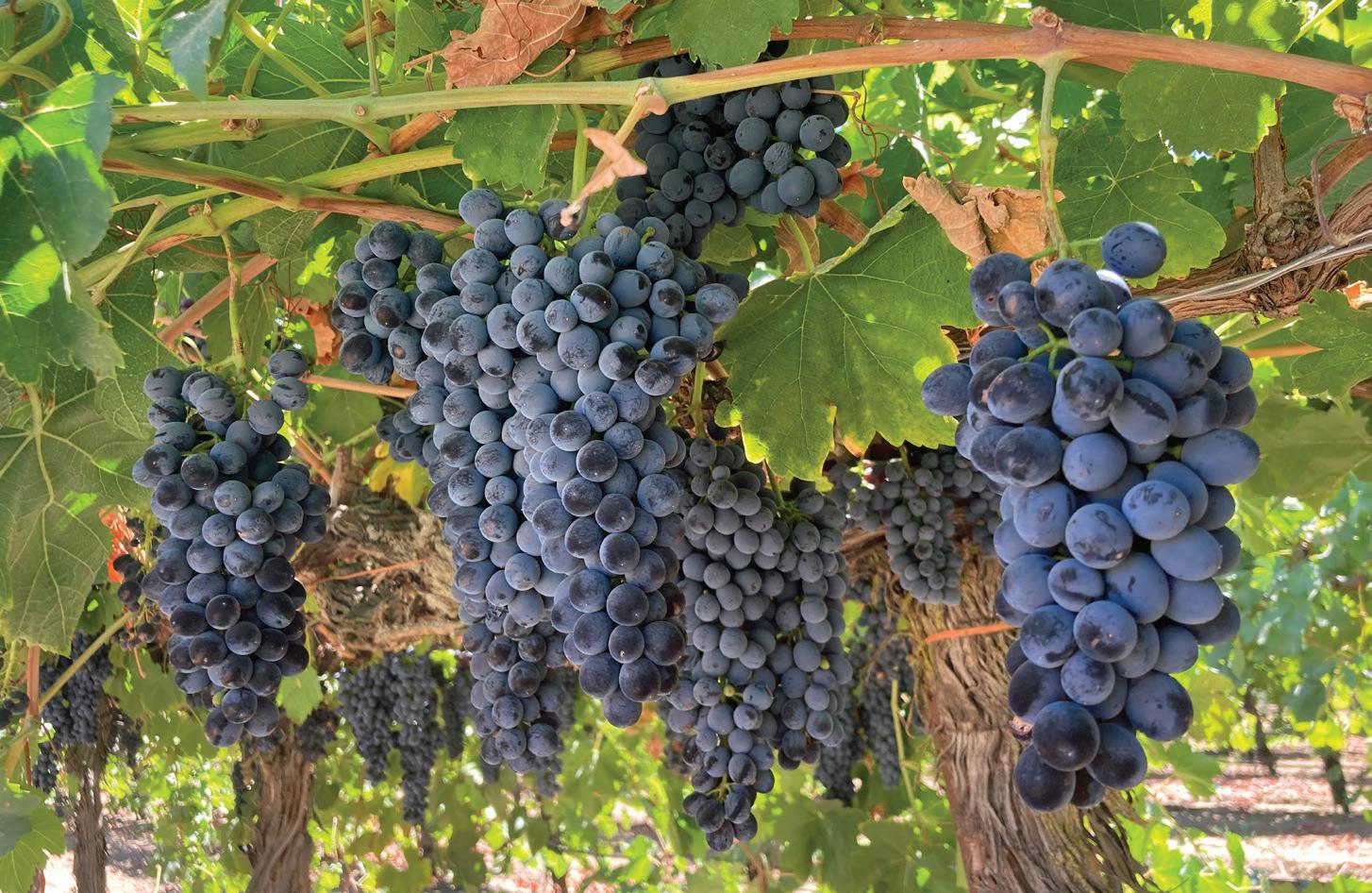
Spencer added, “The federal government subsidizes these imports...there is a loophole in the regulations and the large wineries are taking advantage of it. The U.S. government subsidizes imports to benefit big wineries.”
In the first four months of 2024, the federal government refunded more than
Continued on next page

$21 million in alcohol taxes and duties to subsidize imported wine. The excess wine, he said, has flooded the market and driven down demand for California – grown wines and grapes.
“U.S. trade policy...has helped create this mess by subsidizing imports for the benefit of a few global alcohol companies, “Spencer said. “Other domestic wineries are squeezed out of export markets.”
Almonds endure challenging 2024
The 2023 crop value of almonds was $343.5 million garnering the No. 3 slot in the Top Ten Crops in the Ag Commissioner’s Crop Report and the 2024 crop came in early with nonpareil registering a crop increase of 20% and was 40% of California’s crop. After years of rapid growth, California and San Joaquin almond industries are struggling amid low prices.
“The bloom was good, as was the nut set and the June drop was normal,” commented SJFB Second Vice President Herman Doornenbal. “But the lasting heat caused nut shrivel and we lost two sizes. Yield was affected, but some areas fared better than others.”
He also said the 2.8 billion pounds estimate might not be reached.
“The pollinators are down 12% and we’re still working on them,” said Dave Phippen, partner in Travaille & Phippen in Ripon. “A slight increase in Nonpareil was expected but we’ll know for sure when the Final Shipment Report is released in January.”
The Independence variety had slightly down numbers for the first time.
Phippen said prices were up substantially and the timing was two or three weeks late and “my guess is that the crop will fall short of the estimate which means more support for higher prices,” he said.
2023 was a “dirty” crop – dust and other detritus – and 2024 is dirty but not as bad as 2023 but with “a lot of brown spot damage which was a little surprising. There was stink bug presence and the quality wasn’t as good due to that insect,” Phippen said.
About walnuts and winegrapes, Phippen said, “It reminds me of the 1980’s. It’s been really rough in the county and crop equity is taking a hit. Expenses are higher
and regulations are strangling us, not only almonds but many other crops as well.”
Doornenbal commented, “Everyone had a tough year but 2024 was not much better than last year. Nut prices bottomed out and all nuts are starting to stabilize as almond harvest winds down.”
Walnuts yields down
“We’ve harvested and more are coming,” said Linden area diversified grower Ken Vogel. “Prices are up for Chandlers but crop yields are down and I don’t really know why at this point. Of course, the high summer heat undoubtedly had
an effect.”
Chinchiolo explained that “Chandlers, although having a down volume from an estimate standpoint seem to be alright; the early varieties were down in volume but prices will be up.”
But this decline in yields didn’t change the fact that San Joaquin County is the state’s leading walnut producer with about 71,000 acres planted to walnuts.
Good news came in a statement from the California Walnut Board and Commission: “Preliminary data indicates that the 2023 crop is virtually sold out.” Vogel and
other growers hope this trend continues for the 2024 crop.
Robert Verloop, executive director and CEO of the Commission, said, “The estimated 2024 crop size… is lower than the historic record crop of 2023 [but] due to strong summer demand, we expect the end of season shipment report to show the carry-in volume to be substantially less than last year.”
Heat causes timing issues for cherries Overall, according to the county ag
Continued on next page




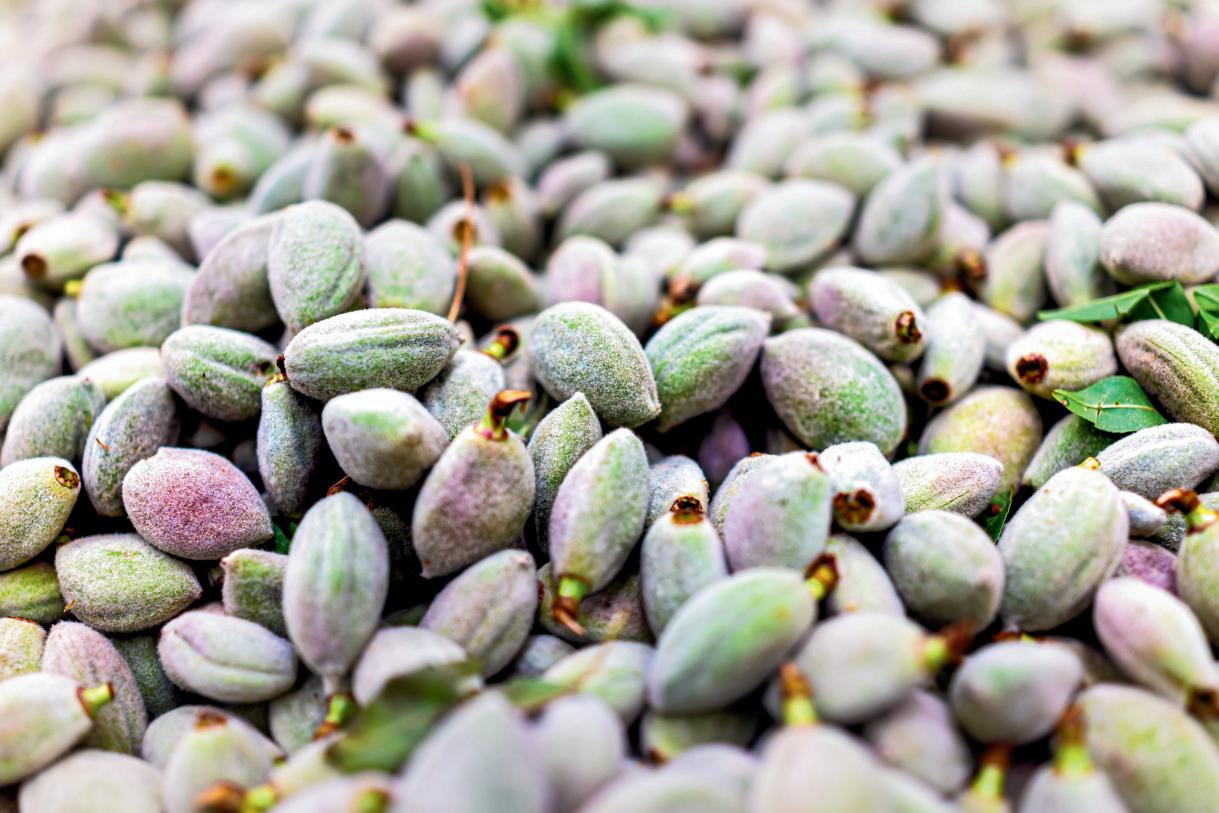
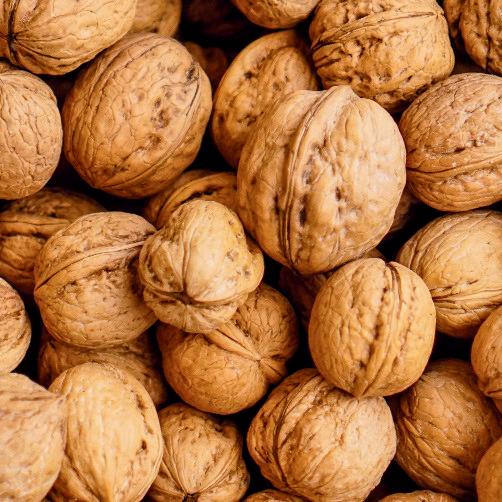
Continued from previous page
commissioner’s Crop Report, 2023’s cherries had a crop value of $273.4 million, down $3 million from the previous year.
About the 2024 cherry crop, Ken Vogel reported, “Early varieties, Corals, did well but Bings didn’t due to too many culls and when Washington’s crop came on the market at the same time as the heat hit local cherries, prices dropped.”
Chinchiolo, who farms cherries, said, “It was a good quality year but I’m disappointed that the industry doesn’t have a better promotion plan. Our cherries are undervalued in the marketplace by how they’re displayed in retail outlets. There’s little or no merchandising to consumers that meets their anticipation for the fruit.”
Vogel said, “I see a lot of orchards up for sale and being removed in our immediate area around Linden. Things change but now change comes faster with more time and costs involved.”
Tomatoes in 2024
The 2023 tomato crop increased significantly over the 2022 version by
$33.2 million to $147.4 million. But the 2024 crop received a state of emergency declaration from the San Joaquin County Board of Supervisors in July when a virus carried by the ubiquitous beef leafhopper was discovered. However, after the appropriate eradication methods were used, the harvest went on as usual.
“There was a lot of green and the estimate is that the crop would be down 15%," said veteran diversified grower Paul Sanguinetti. "Overhead’s eating us up.”
In August, the California Tomato Growers Association announced it had agreed with all processors to $112.50 per ton for 2024. The Association said in a statement that it “considers $112.50 to be a fair and reasonable Base Price for this season.”
Sanguinetti said if a grower has something under contract, they’ll make money but without a contract “it’s challenging.”
Eggs hatching success in 2024
Half of California’s egg production comes from Northern California where the majority of the egg farms are in the San Joaquin Valley with the bulk of the

production coming from San Joaquin, Stanislaus, Merced and Kern counties.
The main breed of chicken laying white eggs is the Single Comb White Leghorn; there are various breeds that lay brown eggs. Contrary to popular rumor, there is no nutritional difference between the colors.
Eggs in the county advanced to the No. 5 spot in 2023 via a comeback after the
California poultry industry was rocked during a nationwide avian flu pandemic in 2022. Millions of chickens were culled with the resulting shortages in poultry supplies and sent prices to consumers soaring. During that poultry panic more than 500,000 California chickens and
Continued on next page

turkeys had the avian [bird] flu.
The threat of bird flu is apparently gone from San Joaquin County according to the USDA Animal and Plant Health Inspection Service; a mere 168 confirmed cases of the disease were confirmed in the county since 2023, with none reported in 2024. Egg prices soared during the bird flu infestation; when birds are ill, fewer eggs are produced and higher prices hit grocery stores.
“Bird flu is the No. 1 reason for higher prices, absolutely,” said Phil Lempert, grocery industry analyst and editor of SuperMarketGuru.com.
Emily Metz, president and CEO of the American Egg Board, said, “The volatility we’ve seen in egg prices is based on many factors, most of which are beyond egg farmer’s control.” She noted that bird flu, strong demand and higher costs for feed, labor, fuel and packaging has driven up prices.
“America’s egg farmers are doing every-
thing they can to keep their costs down while ensuring a steady supply of safe, wholesome, quality eggs,” said Metz.
Cattle and Calves in 2024
About the 8th place commodity on the Agricultural Commissioners Top Ten List of 2023 commodities there were mixed reviews about the 2024 version.
Cattle rancher and SJFB President Les Strojan said, “Prices are higher but input costs are way up.” He said the drought caused problems with feed and heat affected the herds which pushed “some ranchers to sell their cattle down and if they wanted to buy back the prices were much higher.”
The cattle and calf market has been strong throughout 2024 according to cattleman and farmer Kenny Watkins. “It’s been one of our better years with prices strong all year. 2024’s also been a good feed year and the heat has been well managed.” He said cattle ranchers are “Looking forward to rain so we’ll have green grass in our pastures. Overall, I’ve got nothing to cry about in 2024.”






Hay and feed costs didn’t increase “all that much and almond hulls costs for feed were low,” Strojan said, adding that hay production was “way down and people weren’t stocking up on hay as they usually do.”
Paul Sanguinetti explained that his silage crop “was about normal at 25 to 30 tons” but that overhead costs for this and other crops are “eating us up.”
Blueberries continue growth
San Joaquin County’s blueberries hit the Top Ten in the 2023 Ag Commissioner’s Crop Report landing in the No. 9 slot with a value of $81.7 million, an increase of more than $16.8 million over 2022.
And the surge was estimated to continue in 2024 but with product flooding the market again at record levels, lower prices could be in the offing.
According to the California Blueberry Commission, California’s 2024 blueberry crop was estimated at 74.5 million pounds, 53 million heading to the fresh market and 21 million pounds going to processors. That’s an increase from 2023’s
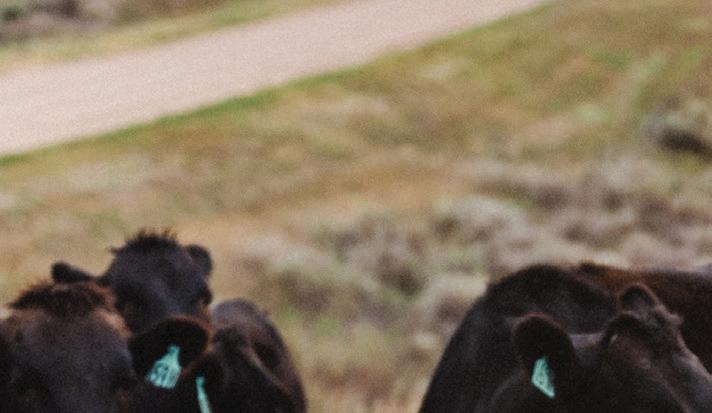

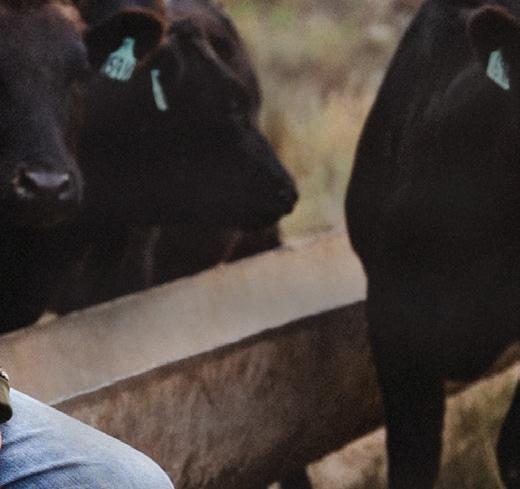

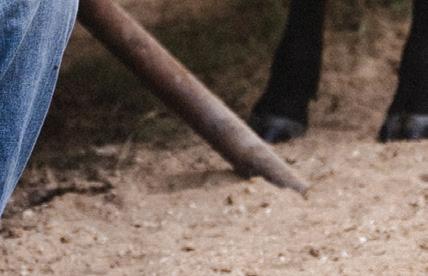


71 million pounds but short of the initial estimate of 80 million pounds.
Why the change? According to Todd Sanders, the commission’s executive director, the 80 million estimate “was adjusted due to some rain damage during bud break that affected fruit set.”
Also, mild temperatures at the beginning of 2024 helped produce a plethora of blossoms on the plant but cold and rainy days in early spring slowed fruit sizing and ripening.
To maintain a competitive posture against imported fruit, Sanders said, “More California blueberry growers have become certified organic” which now make up 45% of the state crop.
Overall, the 2024 blueberry crop looks to maintain its position as a popular commodity.
Silage hits hard times
Hope regarding San Joaquin County’s 2024 silage situation revolves around an ironic hope, said San Joaquin Valley Hay
Continued on next page




Growers Association president and CEO Rick Stass. “Hopefully, the hay and silage market will have hit bottom by the end of the year. This has been the worst hay year for prices in the last five years. It’s been tough and there’s a lot of uncertainty out there.”
Farmers who usually purchase significant amounts of hay “have taken a conservative course and cut back on hay this year,” he said. “It’s been a strange year of really good quality hay but with prices off by $60-$80 per ton.”
Silage corn is pricing at just above the break even point, “selling around $33$34 per ton, off about 20% from 2023,” he said. “Baling costs are now at $45-$48 per bale and stack. Inflation’s hit every element of agriculture.”
The ag ebb and flow of crop acreage being pulled out and replaced by feed crops like silage corn, grains and hay is not balanced and, Stass said, “Farms are either being consolidated, or the small guys are getting out so this business is in a state of flux.”
Other Crops often forgotten but vitally important to SJC ag success
Looming huge in that 2023 crop value total was the amount generated by the “Other Crops” that don’t receive the publicity of the Top Ten but are, nevertheless, a vital component of the county’s agricultural wealth.
Other crops in 2023 accounted for $1,446,620,000 of the total crop value. Other Crops are consistently a powerful driver of the county’s agriculture and perhaps the single most reliable element of the county’s ag production year after year. Individually, the crops accounting for this dollar value may be ignored but their impact of more than $1.4 billion cannot be.
“Our Other Crops show the diversity of SJC agriculture, from the Delta to the Sierra foothills,” Genasci said. “Linden’s cherries and other crops thrive in our microclimate that makes San Joaquin County truly unique. With these crops solidifying our background we’re well positioned to have a positive outlook.”
Sanguinetti is an example of Other Crop success farming lima beans and

barley along with tomatoes, walnuts, almonds and silage.
“Many of the Other Crops values are just outside of the Top Ten,” said SJFB President Les Strojan. “This strength across the board by the huge variety of crops shows the diversity of them and the strength of our soil and water.”
A sampling of the Other Crops value looks like this: rice: $33.1 million; apples: $9.4 million; olives -processing $13.4 million; Peaches-all: $16.5 million; pistachios: $15.4 million; miscellaneous fruits and nuts: $4.9 million; sweet corn: $4.9 million; cucumbers: $6.9 million; garlic: $15.9 million; melons-all: $36.9 million; beans-all: $6.2 million; onions: $11.1 million; peppers: $5.5 million; pumpkins: $30.4 million; squash: $6.7 million.
“The Other Crops category demonstrates the incredible diversity of the county’s agriculture,” Chinchiolo said. “This category is always strong and it’s almost one-half of the total commodity value. And when some Top Ten commodities may be suffering, these crops provide an alternative to consider.”
Continued from page 2
dated mission statement:
“Our mission is to be the premiere advocate for farmers, ranchers and dairymen in San Joaquin County by providing a united voice for governmental, economic, and regulatory issues. We coordinate pertinent training courses, tell agriculture’s story to the general public. and sponsor social events promoting interactions among agriculturalists.”
The elements of the mission statement are not new but rather a recommitment to our core responsibilities to support farmers and farm families. Your membership in the county Farm Bureau also includes membership in the California Farm Bureau and the American Farm Bureau to provide support at all levels of government. For instance, the American Farm
Continued on next page
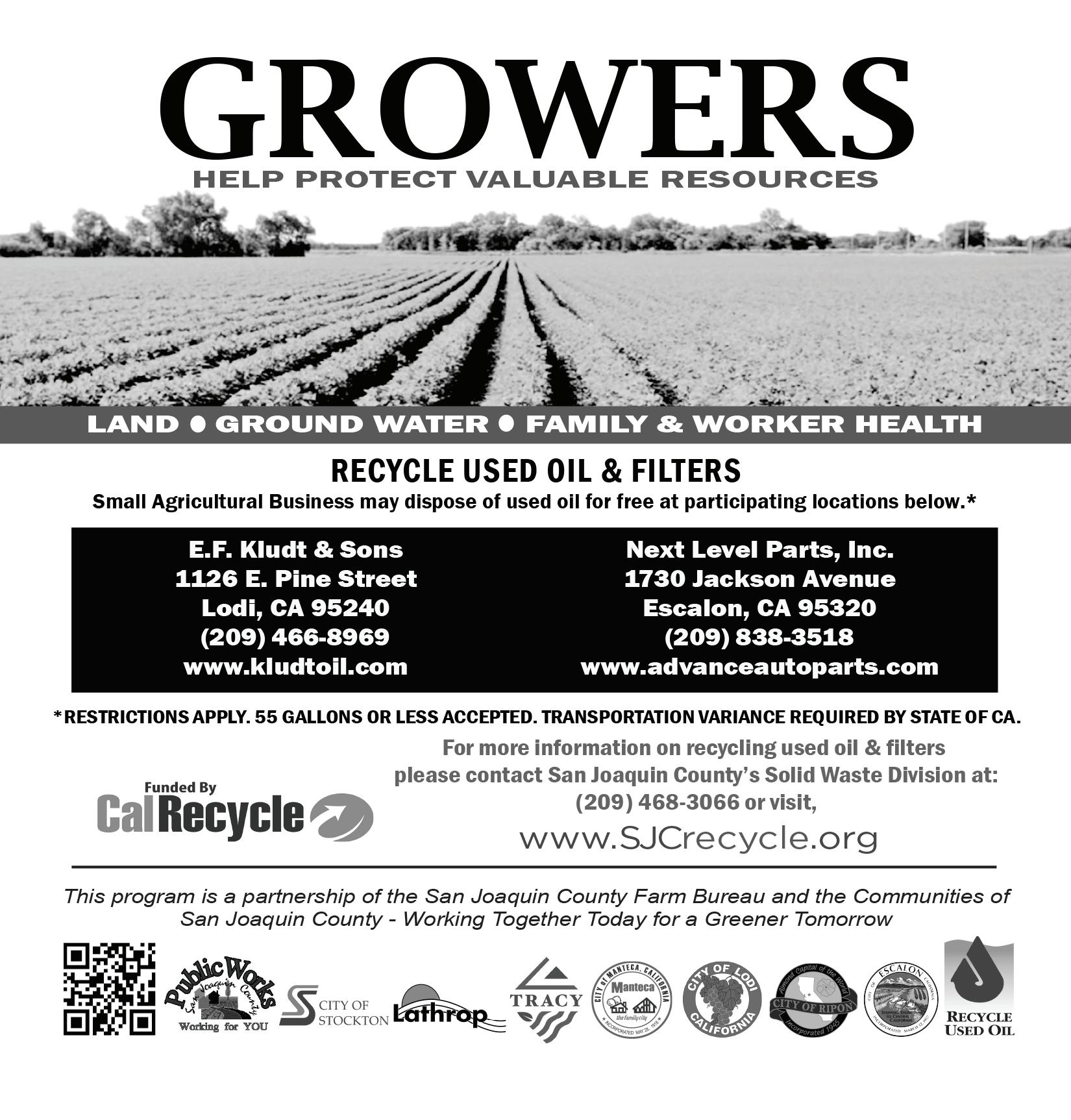
Bureau has recently been pressuring the administration to close the trade gap in agricultural products that has grown with other countries over the last few years.
Farmers have shown over and over they can out produce domestic demand, foreign trade is critical to match supply restoring profitability to the farmer. Advocating in Washington is slow and expensive but is vital to our industry at a reasonable cost to us because it is shared across all the counties across the nation. The work of the California Farm Bureau is exhaustive as seen in the weekly Ag Alert.
We are excited about our 111th year here at the county Farm Bureau and grateful our predecessors left so much to work and build upon. The latent support that I hear in most conversations about Farm Bureau makes our current challenges easier to address. Please feel free to contact me regarding any of our programs and thanks for being a member. Happy Thanksgiving!
Continued from page 2
everything else in the room must go up too. The employee making $25 an hour today will need $27 just to stay even. What is produced at that farm will also have to be competitive with the product’s other farms outside of California, where the federal minimum wage is $7.25 an hour in the U.S. and much lower than even that outside of our country.
On the other side, we have Prop. 36, which will allow for felony charges and increased penalties for certain drug and theft crimes, including organized theft. This will repeal parts of Prop 47, which lowered the penalties for many theft and drug charges, including making theft of less than $950 a misdemeanor. This can be linked to the increase in theft and property crime that has been seen in rural areas where the perpetrators are arrested and then released before the ink on the

Jon Erlandson,



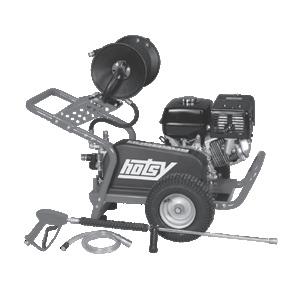
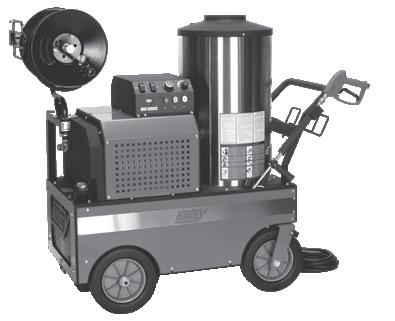
paperwork has even dried. Prop. 36 is a start to push back the lawlessness we have seen across California.
San Joaquin Farm Bureau was proud to join other valley Farm Bureaus in presenting the American Farm Bureau’s Friend of the Farm Bureau award to Congressman John Duarte. The award was presented to the congressman on Oct. 28 at his field office in Turlock. Recipients of this award are selected by the American Farm Bureau’s board of directors. The Friend of the Farm Bureau award is given to legislators chosen for their outstanding service to rural and farm communities.
On the local level here in San Joaquin County, I want to thank everyone who took the time to write the San Joaquin County Planning Commission about the proposal to allow Manufactured/Mobile home parks in agriculturally zoned areas. We were not given much time to organize our members for this meeting, and so we included information in Friday Review that is sent to members for whom we have email addresses. You can imagine what it
looks like to try and farm with a trailer park next door! County staff removed general ag zones from the proposal two days before the meeting, but left ag/industrial zones. The Planning Commission voted to postpone consideration of the issue to allow staff time to meet with organizations like your Farm Bureau to produce a plan that protects agricultural land use. If you are not receiving our Friday Review, let us know and we will get you added. If you do receive it, please look each week as we try and keep it up to date with what is happening here in our office and around the county along with important announcements and information.
While it is the ability of the Farm Bureau to represent all the various aspects of agriculture and not just specific industries that make us unique, it is the ability to bring all those industries to the table that makes us strong! Thank you for being a member of the San Joaquin Farm Bureau and lending us your strength to stand up for agriculture in our county.




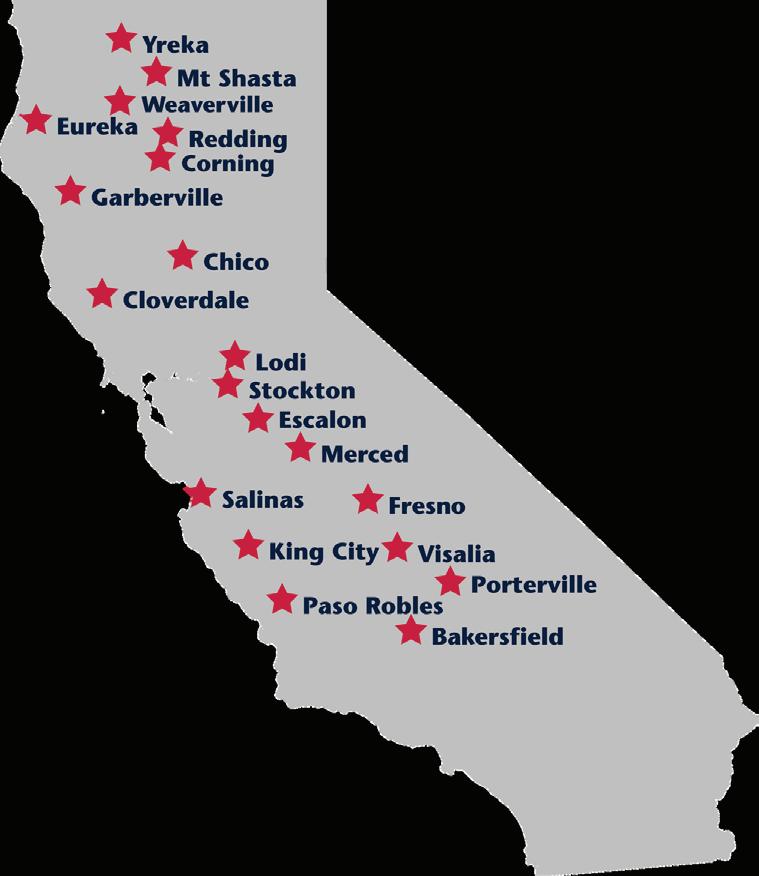




By Jessica Coit
THE WAIT IS FINALLY OVER… the 2025 Gun Calendars are HERE! I would like to start off by giving a special shoutout and thanking the following 2025 Calendar Sponsors: Platinum Sponsor American AgCredit, El Rancho Inn, Travaille and Phippen, Bokides Hesseltine Real Estate Company, Delta Packing of Lodi, Discount Ag Parts, Farmington Memorial Park, H.K.M. Machine & Fabrication, Imagination Wines, Nutrien Ag Solu -
































tions, Precissi Ag Services, Reece Spray Service, Sanguinetti & Co. Insurance Brokers, Valley Pacific Petroleum Services and Winters Farming. These companies are always so eager to step up and support Farm Bureau, and we encourage you to do the same and support our sponsors!
As always, the calendars are sold for $100 each and the weekly winners have the opportunity to buy back into the raffle. It is $150 to re-enter prior to July 1
and $100 any time after that. All guns are provided through The Outdoor Sportsman in Stockton, and all winners must pay registration and related transfer fees. Since 2025 starts on a Wednesday, there are actually 53 guns to raffle off rather than the typical 52! There are only 530 calendars printed, and they have been flying off the shelf! Be sure to reach out to the SJFB office at your earliest convenience to claim your 2025 calendars.
It is also that time of the year to register for the 2025 California Farm Bureau Annual Meeting and YF&R State Conference! This year, the conferences will be held in Monterey at the Monterey Conference Center and Monterey Marriott Dec. 7-10. The theme of this year’s Annual Meeting is Stronger Together! This reflects the dedication and unity of California Farm Bureau members who support and feed America while working to preserve traditions and secure the future for California farmers, ranchers and agricultural businesses.
As in prior years, the YF&R State Conference will be in conjunction with the
CAFB Annual Meeting, with the YF&R State Conference preceding Annual Meeting. YF&R State Conference will be held from Saturday, Dec. 7 until Sunday, Dec. 8. The CAFB Annual Meeting will be held from Sunday, Dec. 8 until Tuesday, Dec. 10. To learn more about the conferences, or to register, please visit, www.cfbf.com/ events/annual-meeting
Finally, the SJFB Foundation for Agricultural Education is happy to announce that they will be hosting another Wine Tasting fundraiser next March! The board is currently looking for sponsors and vendors that would like to support the upcoming event. All vendors and sponsors that are confirmed before the end of the year will be listed on the event invitations. For more information about the event, or to inquire about becoming a vendor and/or sponsor, please contact the SJFB office at (209) 931-4931 or email ageducation@sjfb.org.
And as always, please do not hesitate to reach out to the SJFB office if you need anything. We are open from 9 a.m. to 4 p.m. daily and can be reached at (209) 931-4931.





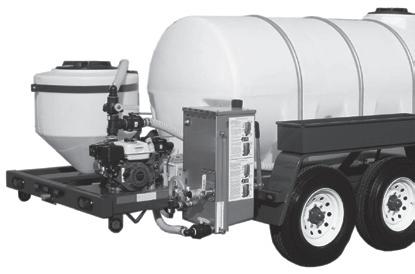



























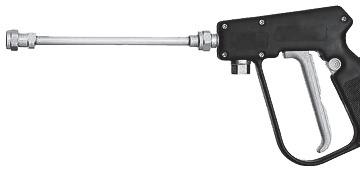





















By San Joaquin County Rural Crime Division
Tool/equipment/wire theft
In the 300 block of E Blewett Road in Tracy, an unknown suspect stole a 2018 Caterpillar mini excavator valued at $39,000. 24-15675
In the 8000 block of W Howard Road in Stockton, an unknown suspect stole two box scrapers implements (yellow Schmeiser, green American Ind). The total value is $17,500.
In the area of Koster Rd/S Hwy 33 in Tracy, an unknown suspect stole a 2016 John Deere model 5100 ML tractor valued at $55,000.
In the 14000 block of E Mariposa Road in Stockton, an unknown suspect stole approximately 60 feet of high voltage electrical copper wire from breaker panel/ ag pump valued at $1,500.
In the 21000 block of S Hwy 99 in Ripon, an unknown suspect stole approximately 50 feet of copper wire, $1,000 total loss.
In the 10000 block of E Fairchild Lane in Stockton, an unknown suspect stole 240 feet of copper wire. The total value is $5,000.
Recovered property
In the City of Hollister, local farmer located stolen John Deere tractor model 5100 ML, property returned to victim, valued at $55,000.
In the 21000 block of S Carrolton Ave. in Ripon, local farmer located a stolen John Deere tractor 5115 ML and Schmeiser implement, property returned to victim, valued $60,000.
Commodity/livestock theft and other ag related cases
In the area of S Kaiser Road/E Mariposa Road in Stockton, two males, who were later arrested, stole 69 watermelons valued at $350.
A load of walnuts that was being
transported from Linden to Southern California was misdirected by false broker, to Gardena, California. The total loss of product is $75,777.
In the 20000 block of E Catherine Way in Escalon, unknown suspects opened an irrigation valve causing flooding to almond orchard and damaging the fruit on the ground. The estimated loss is $50,000.
In the 15000 block of E Santos Ave. in Ripon, multiple suspects stole fuel on several occasions throughout the month of September, as well as a John Deere tractor and Schmeiser implement. The estimated loss for fuel is $1,000, equipment is $60,000.
Arrested persons
Phen Dahn arrested for grand theft of crops, conspiracy to commit a felony, and possession of stolen property.
Phal Dahn arrested for grand theft of agricultural product, conspiracy to commit a felony, and possession of stolen property.
Christina Tafoya arrested for kidnapping, felony conspiracy to commit criminal acts and robbery.
Santos Rael arrested for kidnapping, robbery, assault with a deadly weapon, felony conspiracy to commit criminal acts and torture/mayhem.
Jasmine Fuentes arrested for a felony warrant related to a stolen vehicle.
Justin Conhiser arrested for vehicle theft, fuel theft, possession of stolen property, ID theft and parole violation.
Matthew Reyes arrested for vehicle theft, possession of stolen property.
Please report any and all suspicious activity. For non-emergency reports 24 hours a day, you can call (209) 4684400. In the event of an emergency, call 911.
Thank you to our San Joaquin Farm Bureau Agricultural Members who have stepped up. Farm Bureau is a grassroots organization whose purpose is to devote time and resources to promoting and protecting agriculture in our county, state, and nation. The “Step Up Plan” is designed for members to be able to pick their dues level based on their Annual Gross Income to increase their support of agriculture and help us increase our efforts in fighting for agriculture. Business Members also have a Step Up Plan. The Step Up Plan is outlined on our website. Contact our office at (209) 931-4931 to “Step Up” your membership today.
Acampo Farm Center
• Lamar Creekside Vineyards
• Mahil Farms
• Brent Newport
• Nestor Enterprises
• S&R Egg Ranch Co.
• Nuss Farms Inc.
Calla-Nile Farm Center
• 2Q Farming Inc
• Manuel Azevedo
• David Boersma
• Bourbeau Enterprises
• Brocchini Farms Inc
• Cardoza Bros
• Central Valley Welding Mechanical Inc
• Delta Growers Inc.
• Double O Farming Inc.
• Jenkins Poultry Farm
• Joseph Gomes
• David Kamper
• Eileen Kuil
• Ioppini Farms
• Edward Machado
• Phippen Bros
• Roorda Ranches Inc
• SJC Office of Education
• SKS Enterprise Inc
• John Van Duyn
• Bryan Van Groningen
• Van Till Farms
• Michael Weststeyn Farming
• Tim Weststeyn Collegeville Farm Center
• Nomellini Farms Inc
• Prins Dairy LP
• Paul Sanguinetti
• Les Strojan
• Grant Thompson
• Thompson Ranch
• Triple S Farming LLC Escalon Farm Center
• A&A Cattle Co
• Adrian Ranch
• Bert Ballatore
• Bavaro Farming Company Inc
• Lealon Brumley
• Phillip Brumley
• Gary De Vries
• Herman Doornenbal Jr
• Larry Fredricks
• G&E Te Velde Orchards MLLC
• Caleb Gervase
• River Bend Orchards
• Roche Bros Inc
• Stagnaro Farms Inc
• Vander Schaaf Dairy
• Veenstra Farming
• Paul Voortman
• Wagner Dairy
Lafayette Farm Center
• All State Packers
• Chardon Farms Inc
• Joe Cotta & Son
• Michael Devencenzi
• Peter Devencenzi
• Graffigna Fruit Co
• Richard Grenz
• Rob Kammerer
• Lange Twins Partnership
• Matthew Lauchland
• Joe Marchesotti Co., Inc.
• Lima Ranch
• Diego Olagaray
• Joe Olagaray
• Rodney Schatz
• Van Diemen Farms
• Bronson Van Wyck
• Watanabe Bros, Inc.
Linden Farm Center
• 5 Star Farm Management Inc
• A&A Dasso Farms
• Bella Vista Ranch
• Greg Busalacchi
• Camera Brothers
• D&L Farms Inc.
• Eilers Ranch LLC
• FFD Orchards
• Ferrari Farms Inc
• J&A Solari Inc.
• Jasbir S Gill Family Limited Partnership
• Lagorio Properties LP
• Lodi Farming Inc
• Panella Trucking LLC
• Peter Boysen Realty
• Precision Irrigation Mgt
• Purviance Drillers Inc
• R&A Miller Inc
• RDJ Farms Inc
• Waterloo Orchards Inc
• Richard Zolezzi
Roberts-Union Farm Center
• Cubiburu Livestock
• D&A Farms
• Mark Lewis
• El Dorado Farms Inc
• Marca Bella Farms, Inc
• Zuckerman-Heritage Inc
Tracy Farm Center
• California Masterplant
• GloriAnn Farms Inc
• Mizuno Farms Inc
• Michael Petz
• Greg Pombo
• Reece Farms
• Hal Robertson
• Thomsen Farms Inc
• Yamasaki Farms
Victor Farm Center
• John Kautz Farms
• Vink Custom Farming Inc.
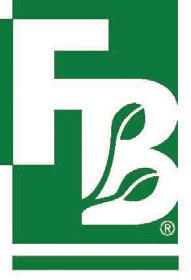
$7,500 SUPPORT LEVEL
American Ag Credit
Jacob DeBoer 2345 E. Earhart Ave., Stockton, CA 95206
www.agloan.com (209) 944-7478
Nationwide Insurance
Find a Farm Certified Agent: www.nationwide.com/cfbf (800) 255-9913
ACCOUNTANTS
Bowman & Company
Gary R. Daniel (209) 473-1040
Croce, Sanguinetti & Vander Veen Inc.
Pauline Sanguinetti (209) 938-1010
ASSOCIATIONS
California Farmland Trust
Charlotte Mitchell (916) 544-2712
Lodi District Grape Growers Association
Amy Blagg (209) 339-8246
Lodi Woodbridge Winegrape Commission
Stuart Spencer (209) 367-4727
San Joaquin County Historical Society
Phillip Merlo (209) 331-2055
San Joaquin Valley Hay Growers
Rick Staas (209) 835-1662
ATTORNEYS
John Herrick Attorney at Law
John H. Herrick (209) 956-0150
Nomellini, Grilli & Mcdaniel Professional Law Corp.
Dante John Nomellini (209) 465-5883
AUCTIONS
Mulrooney Auctions Co.
James P. Mulrooney (209) 366-0600
AUTO PARTS/SERVICE
Clutch & Brake Xchange
James Hitchock (209) 466-9049
$1,500 SUPPORT LEVEL
Delicato Vineyards
Marie Mathews 12001 S Highway 99, Manteca, CA 95336-8499 www.delicato.com (209) 824-3600
Pacific Gas & Electric
Dylan George 4040 N W Lane, Stockton, CA 95204 www.pge.com (209) 932-6515
Ralph Hayes & Son Inc.
Eric Hayes 20177 S. MacArthus Dr., Tracy, CA 95304 www.hayesandson.com (209) 835-4914
CHEMICALS
Mid Valley Agricultural Services Inc. (209) 851-3200
CIVIL ENGINEERING
Kjeldsen, Sinnock & Neudeck
Christopher H. Neudeck (209) 946-0268 Offfice (209) 481-0316 Mobile
COMMODITY PACKING/ MKTG
A Sambado & Sons Inc.
Lawrence Sambado (209) 931-2568
Delta Packing Co of Lodi Inc. Annamarie Costamagna (209) 334-1023
M&R Co Reynolds Packing Co.
Jeremy Hjelmstad (209) 369-2725
Travaille And Phippen Dave Phippen (209) 599-6111
COMMUNICATIONS
unWired Broadband
Mark Peterson (559) 753-0386
CONTRACTORS/CONSTRUCTION
Ford Construction Co. (209) 333-1116
Tom Mayo Construction Tom D. Mayo (209) 943-6248
CONSULTING
Cal Ag Safety
Ann Curtoni Lial (209) 351-0321
Precessi Ag Services Inc.
Paul Precessi (209) 670-9072
$1,500 SUPPORT LEVEL CONT.
Travaille & Phippen
Dave Phippen 12700 E Graves Rd., Manteca, CA 95336 www.tapalmonds.com (209) 599-6111
$750 SUPPORT LEVEL A Sambado & Sons, Inc. (209) 931-2568
Anteris Agronomics LLC (209) 900-3270
Big Valley Tractor & Bobcat Central, Inc. (209) 762-6413
GAR Bennett LLC (559) 480-3029
CUSTOM HARVESTING
M2 Farming
Nick Mussi (209) 969-3333
CUSTOM PACKAGING
The Packagers LLC
Jason Ng 702) 863-9898
EDUCATION
San Joaquin Delta Community College (209) 954-5151
FARMS
A&B Koster
William M. Koster (209) 836-4690
Ag West Inc
Mike Berg (209) 888-5455
AM Farms
Paul Marchini (209) 462-1185
Bert Bacchetti Farms Inc.
Mark Bacchetti (209) 835-2224
HRM Farms Inc.
Glenn Burgin (209) 465-8413
IDC Farms Inc.
Mike Conrad (209) 894-6408
Lavagnino Orchards
Ruani Lavagnino (209) 931-6728
Lucadeira Farms
Richard Marcucci (209) 481-3641
Peterson Family Vineyards
James Peterson (209) 368-8102
Vaccarezza Bros (209) 887-3163
FARMS CONT.
Van Groningen & Sons Inc
Dan Van Groningen (209) 982-5248
Van Groningen Orchards
Mark Van Groningen (209) 599-4944
Van Laar Farms
James Van Laar (209) 599-3613
FARM HARDWARE & SUPPLY
BG Agri Sales & Service
Anthony Da Valle (209) 931-7650
Discount Ag Parts
Jim Allen (209) 239-5802
J. Milano Company
Gary Milano (209) 944-0902
PBM Supply & Manufacturing
Barry Jones (530) 345-1334
Stanislaus Farm Supply
Joey Gonsalves (209) 538-7070
Zylstra Auto & Hardware
Tim A. Zylstra (209) 887-3626
FERTILIZERS & SOIL AMENDMENTS
Brown Sand, Inc.
Robert Brown (209) 234-1500
Ralph Hayes & Son Inc.
Eric Hayes (209) 835-4914 F
San Joaquin Sulphur Company
Janet Chandler (209) 368-6676
$750 SUPPORT LEVEL CONT.
Kludt Oil & Propane (209) 368-0634 • (209) 466-8969
Mid Valley Agricultural Services Inc. (209) 851-3200
Morrill Industries (209) 838-2550
Outdoor Sportsman Inc (209) 957-4867
Van De Pol Enterprises (209) 944-9115
Van Groningen & Sons Inc. (209) 982-5248
V V Enterprises (209) 599-7776
American AgCredit
Marc Busalacchi (800) 659-FARM
Bank of Stockton
Jim Nemmers (209) 249-2201
Community West Bank
Nora Andrade (559) 323-3402
Farmers & Merchants Bank
Daniel Meza (209) 367-2349
Moss Adams LLP
Eric Krienert (209) 955-6100 UEL DISTRIBUTORS
FUEL DISTRIBUTORS
Campora Propane Services
Todd Spicer (209) 466-8611
George W Lowry Inc.
Richard A. Lowry (209) 545-0791
Kludt Oil & Propane
Aron Kludt (209) 368-0634, (209) 466-8969
Valley Pacific Petroleum Service, Inc.
Rob Goodman (209) 948-9412
Van De Pol Enterprises
Tom Van De Pol (209) 944-9115
Van Unen Miersma Propane Inc
Jerry Behlen (209) 823-1315
GRAIN/FEED/SEED
AL Gilbert Company Jay Gilbert (209) 847-1721
Baglietto Seeds (209) 466-0433
Escalon Feed & Supply
Ken Van Gorkum (209) 838-3326
M & M Feed Service
Terry Mulder (209) 531-3353
Phil O’Connell Grain Co.
Tim Grunsky (209) 465-5871
Triple P Feeds
Dallas C. Paul (209) 333-2808
V-V Enterprises
Dave C. Van Vliet (209) 599-7776
INSURANCE
Altamont Insurance Brokers
Dan Simonich (209) 835-6395
Big Valley Insurance
Bill R. Crawford (209) 835-5253 (209) 365-9600
Dan Van Vuren Insurance Agency Inc.
Dan Van Vuren (209) 484-5578
Sanguinetti & Company Insurance Brokers
Karen Sanguinetti (209) 954-1000
The Zenith
Sandy Fiack (559) 260-6499
Todd Garibaldi Insurance Agency
Todd R. Garibaldi (209) 334-3030
Wever Insurance
Don Wever (209) 599-2161
IRRIGATION/PUMPS/WELLS
Laurel Ag & Water
Brooke Marchy (209) 810-8021
GAR Bennett LLC
Ralph Rendon (559) 480-3029
Moorman’s Water Systems Inc.
Larry Moorman (209) 931-3210 REAL ESTATE
Pacific Southwest Irrigation Corp.
Jim Clare (209) 986-0099
Rain for Rent
Gregory McDevitt (209) 466-5602
LABORATORY/TESTING
Anteris Agronomics LLC
Kion Kashefi (209) 900-3270
Fruit Growers Laboratory, Inc.
Michael Ostrom (800) 440-7821
LABOR CONTRACTOR
Premium Employment Services
Jesse Alderete, III (800) 581-5540
LAND PREPARATION
G&F Ag Services, Inc.
Randy Fondse (209) 599-8911
Kromann & Company
Rodney P. Kromann, Jr. (209) 581-1775
Kuil Brothers Ag Service
Matthew D. Kuil (209) 599-4960
Ag Industrial Manufacturing
Bob Ford (209) 369-1994
Tuff Boy Sales, inc
Martin Harris (209) 858-4131
MEDIA/RADIO
“105.9, the Bull”
Robert La Rue (209) 948-5786
NURSERIES
Burchell Nursery
Tom Burchell (209) 845-8733
Casa Cristal Nursery Inc
John Moso (661) 792-6468
Dave Wilson Nursery
Robert Woolley (209) 874-1821
Duarte Nursery
Alex Duarte (209) 531-0351
PEST MANAGEMENT TOOLS
Outdoor Sportsman
Eric Johnson (209) 957-4867PROCESSING
PROCESSING
County Fair Food Products
Leslie Kruger (209) 469-9934
DeRuosi Nut
Dean Penero (209) 838-8307
Musco Family Olive Company Ben Gibbons (209) 836-4600
Pearl Crop Inc. Ulash Turkhan (209) 808-7575
Prima Frutta Packing Tim Sambado (209) 931-1460
ShellPro Inc. (209) 727-0707U
Sunrise Fresh LLC Jake Samuel (209) 932-0192
REAL ESTATE
Bokides - Hesseltine Real Estate Co.
Robert Hesseltine (209) 334-3045
Peter Boysen Realty
Pete Boysen (209) 351-2150
Petersen & Company
Agricultural Real Estate Joe Petersen (209) 210-8010
Reeve Associates Real Estate
Gary Reeve (209) 835-2002
Wagner Land Company
Charles Wagner (209) 942-4146
De Vinci’s Corporation
Chris Trotter (209) 887-2121
Koes Bar
Ken Littleton (209) 329-2366
RETAIL
Orchard and Vineyard Supply (209) 368-8595
SOLAR
Chico Electric
Norm Neilsen (530) 891-6749
SPREADING SERVICES
Gary Bohnet (209) 369-6993, (209) 481-1349
STEEL BUILDINGS
Fabri Steel West Inc.
John M. Arizcuren (800) 411-4215
Roland Construction
Jim A. Hoagland (209) 462-2687
STEAM CLEANERS
Hotsy Pacific
Jim O’Connell (800) 640-1227
TIRES
Les Schwab Tire Center-Lodi
Gary Holm (209) 334-3961
Lodi Tire Service
Kenneth A. Lung (209) 369-1985
Swier Tire & Auto Repair
Daniel Swier (209) 559-7512
TRACTORS/EQUIPMENT
Belkorp Ag, LLC
John Gilligan (209) 538-3831
Big Valley Tractor & Bobcat Central, Inc.
Don Franzia (209) 762-6413
Evolution Equipment Services Inc.
Marti Sporleder (209) 810-5796
TRACTORS/EQUIPMENT CONT.
Garton Tractor
Jeff Filkins (209) 948-5401
Pape´ Machinery
Brian A. Heavey (209) 983-8122
TRANSPLANTERS/PLUG PLANTER
Pro Plant LLC
Skip Wilbur (209) 969-7547
TRANSPORTATION
Antonini Bros. Inc.
Joseph Antonini (209) 466-9041
G3 Enterprises
Ethan Jones (800) 321-8747
Hammer Trucking
Michael J. Staples (209) 481-1567
Silva Trucking
Dave Silva (209) 982-1114
UTILITIES
PG&E
Debbie McCaffrey (209) 932-2566
VEHICLES
Chase Chevrolet
Paul Correia (209) 475-6740
Interstate Truck Center
Rick Coslett (209) 944-5821EMENT
VINEYARD MANAGEMENT
Arbor Vineyards
Larry P. Mettler (209) 339-0525
K.G. Vineyard Management, LLC
Ben Kolber (209) 367-8996
R-N-R Vineyard, Inc.
Russell Machado (209) 327-3165
Oakdale Irrigation District
Steve Knell (209) 847-0341
South San Joaquin Irrigation District
Peter Rietkerk (209) 249-4600
Stockton East Water District
Scot Moody (209) 948-0333
Woodbridge Irrigation District
Keith Bussman (209) 625-8438
WINERIES
Bokisch Vineyards
Markus Bokisch (209) 334-4338
Constellation Wines US, Inc.
Paul Dismukes (209) 369-5861
Delicato Vineyards
Marie Mathews (209) 824-3600
Jahant Vineyards LLC
Kevin Phillips (209) 368-7384
LangeTwins Winery & Vineyards (209) 334-9780
The Lucas Winery
David Lucas (209) 368-2006
Michael David Vineyards
Michael J. Phillips (209) 368-7384
St. Amant Winery
Barbara S. Spencer (209) 367-0646

